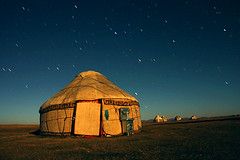 Image by dwrawlinson via Flickr
Image by dwrawlinson via FlickrWas the violence due to third party instigation? Probably, considering that the Kyrgyz Republic has suffered little from ethnic violence since independence. Osh is a predominantly Uzbek city, but there is little to indicate that the majority of Kyrgyz bore any sort of animosity toward the majority. Only in 1990 has the area seen this type of violence which has more to do with culture than ethnicity. The third party may indeed be the Bakiyev family whose removal from power cost their clan a great deal – both in power and money. Bakiyev’s son, who ran a particularly venal and corrupt operation, lost control of his cash generating vehicles of water and hydro-power, not to mention his percentage interest in the casino at the Hyatt in Bishkek. Attempting to destabilize the interim government by provoking attacks against Uzbek’s in southern Kyrgyzstan would be one, albeit short-sighted and ineffective ways of reversing the results of the revolution. Ineffective because, should the violence had continued it almost surely would have provoked a Russian military intervention and Moscow was decidedly in favour of the interim government. Furthermore, Tashkent might have intervened as well, although Russian troops would have likely prevented that from ever taking place.
Would Russia have been so cynical as to incite civil war for the sole purpose of sending troops to assure control over Bishkek? This does not seem plausible for two reasons. The first is that they supported the ouster of Bakiyev in the first place. Not the least because he reneged on the deal to toss out the NATA (read US) airbase in Manas, but also because he was completely unreliable – for anyone. The second reason is that Russia would need an invitation to rescue the interim government, which never came. The last thing Russia needs is another Georgia either politically or militarily.
Finally, it is difficult to follow the reasoning behind the claim of Islamic extremists. There is no evidence of any type of Islamic militancy being behind the events. It is in the interests of Tashkent – who threw the militants out of the Ferghana valley – and Bishkek to share any information regarding Islamic militant activity. The fact that the Uzbek military made no move to intervene makes this scenario exceedingly unlikely.
Which brings me back to the original point. Why convene an international investigation? The threat to stability in the region is certainly a concern – but not to the UN which would take forever to come to a conclusion while simultaneously irritating everyone in Bishkek, Tashkent and Moscow and accomplish, as usual, nothing.
An investigation by the OSCE, currently chaired by Kazakhstan, might be of some use, but to what end? To assign blame? That would be an enormous waste of time and might raise the temperature rather than the opposite. A regional discussion would be useful, behind the scenes and one not aimed at identifying a culprit. In Central Asia issues such as this are not discussed publically. They are addressed in private and in Astana, Bishkek or Tashkent. Keep in mind that the Kazaks treat the Kyrgyz as their little brothers, with more than a little condescension. The Uzbeks are the largest and most powerful country in the region, a fact that causes concern in the Kremlin, and not inclined to be tolerant of bad publicity. The Kyrgyz are fiercely proud and already feel put upon by the US, Russia, China and the rest of their neighbours, except the Tajiks, who are in worse shape.

No comments:
Post a Comment